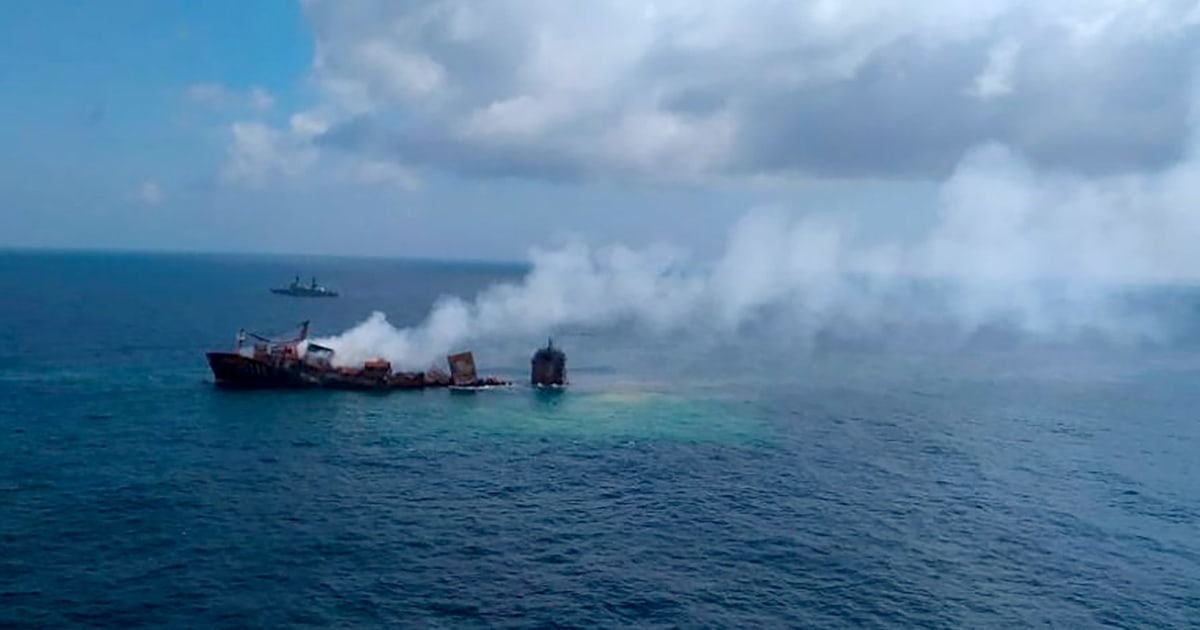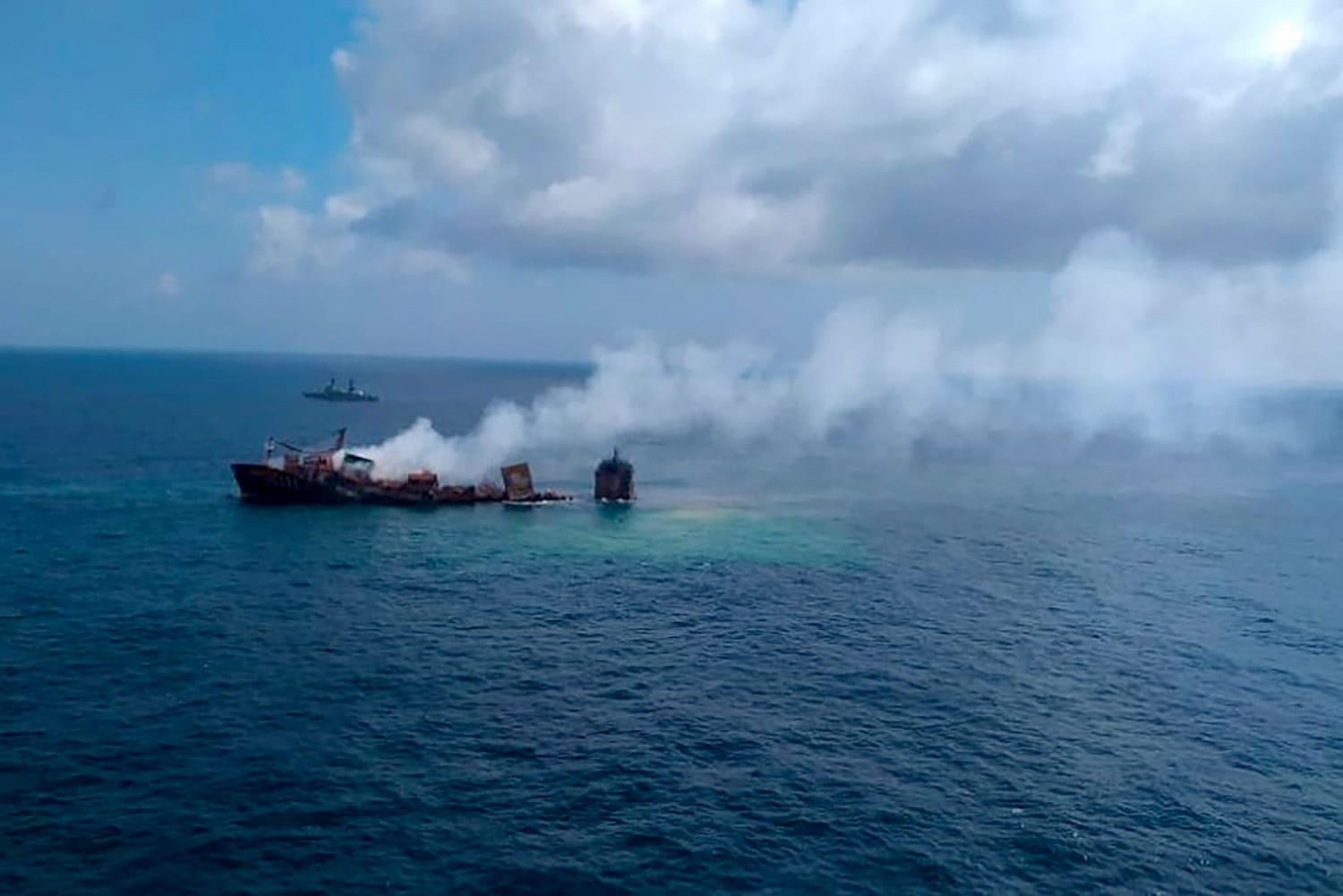
Fears of a major environmental disaster grew on Wednesday after a cargo ship laden with chemicals began to sink after nearly two weeks ablaze off the west coast of Sri Lanka.
The Singapore-flagged X-Press Pearl has already left the country’s coastline covered in tons of plastic pellets and now threatened to spill oil into its rich fishing waters as Sri Lanka faced one of its worst-ever marine disasters.
The government has banned fishing, a crucial economic industry, along about 50 miles of coast in the wake of the incident. Authorities have also deployed hundreds of soldiers to clean affected beaches and warned residents not to touch the debris because it could be contaminated with harmful chemicals.
Sri Lanka is famous for its beautiful coast lines and has emerged as a budding tourism destination in recent years after its civil war ended in 2009. But its tourism sector took a heavy hit from the Covid-19 pandemic and 2019 Easter terrorist attacks.
The fire had been burning since May 20. It was finally put out on Tuesday, but the vessel then began sinking, according to the country’s navy and government officials.
Sri Lanka’s fisheries minister, Kanchana Wijesekera, said in a tweet Wednesday that emergency prevention measures were being taken to protect the lagoon and surrounding areas in order to contain the damage from any debris or in case of an oil leak.
A Sri Lankan Navy spokesman, Captain Indika Silva, told NBC News on the phone Wednesday that an effort to tow the ship into deeper waters was not successful and had to be abandoned halfway through, as the rear part of the ship had sunk and was resting on the sea floor while the bow remained afloat.
Silva said there was water inside the ship and their main concern was the possibility of an oil spill, although they had not yet observed any oil slicks.
“We stand ready with all necessary equipment to respond,” Silva said.
X-Press Feeders, which owns and operates the ship, also confirmed in a statement that efforts to move the ship to deeper waters and away from the coastline had failed.
Download the NBC News app for breaking news and politics
Footage shared by the Sri Lankan air force on Wednesday showed the ship’s burned-out, partially sunk wreckage still smoldering.
The fire-ravaged ship was transporting 1,486 containers, including 25 tons of nitric acid, along with other chemicals and cosmetics.
As the fire was being extinguished, flaming containers laden with chemicals had fallen from the ship’s deck or broken open on the deck, spilling their cargo into the sea.
“It’s the worst environmental disaster for Sri Lanka,” Charitha Pattiaratchi, professor of coastal oceanography at the University of Western Australia, told NBC News on the phone from Perth, Australia.
Pattiaratchi said he was most concerned about the possibility of an oil spill should the ship sink completely, and its fuel leaking into the ocean “sooner or later.” The ship was carrying nearly 300 tons of heavy fuel oil at the time of the incident, the ship’s owner said.
There was also uncertainty about the exact nature of the chemicals in the more than 1,400 containers aboard, he added.
Another major concern are the plastic pellets, used to make plastic bags, that escaped into the ocean from the ship. Thick layers of them have been washing up along the country’s stunning coastline of gold-sand beaches.
Sri Lankan navy and army personnel were dispatched to collect plastic pellets washing up on some beaches. Photos and videos showed people wearing white protective suits, rubber gloves and goggles collecting bags of pellets from the sand and water.
The Marine Environment Protection Authority said on its Facebook page Tuesday that six clean-ups were conducted at 14 locations. X-Press Feeders said Wednesday it was working with local authorities on the shoreline clean-up.
Pattiaratchi said plastic pallets have been a scourge for oceans around the world, with an estimated 230,000 tons entering oceans every year, and the estimated 3 billion spilled off the Sri Lankan coast are likely to migrate into other parts of the ocean.
Modeling conducted by Pattiaratchi and other researchers at the University of Western Australia suggests the so-called “nurdles,” which have travelled southwest after leaking from the burning ship, will now migrate back along the west coast and further north along the island.
Pattiaratchi expects them to make it as far as Indonesia and the Maldives in 40 to 50 days.
Notoriously difficult to clean up, he said they will likely stay in the environment “for generations” to come.
Although they are not known to be toxic to humans, Pattiaratchi said, they can endanger marine wildlife by getting caught in the gills of fish or ingested by sea turtles.
Local television channels in Sri Lanka have been showing dead fish, turtles and other marine life that has washed ashore in recent days.
Source: | This article originally belongs to Nbcnews.com









